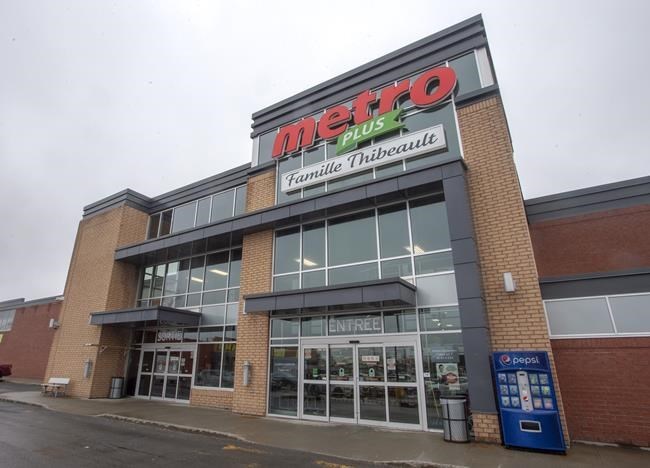Vaccine mandates for truckers have raised transportation costs — but haven't impacted the shipment of goods to stores, the head of one of Canada's largest grocery chains says.
Instead, Metro president and CEO Eric La Flèche said Tuesday the biggest impact on Canada's food industry supply chain has been worker absenteeism due to COVID-19 protocols.
The labour shortage caused by quarantined workers has impacted the entire supply chain — including retail stores, distribution centres and suppliers as well as transportation — driving sporadic outages of certain products, he said.
"The domino effect clearly has had an impact over the last month on supply chain," La Flèche said.
Yet while there might be less depth and variety to Metro's product assortment than usual, La Flèche said "there's still food on store shelves."
"There’s certainly less variety than there should be and we’re not as full as we’d like to be," he said. "But we’re not missing food out there."
Meanwhile, the worst of the product delays and shortages might have passed, La Flèche said.
"More and more people that were infected are back at work, both at our suppliers and in our own operations," he said. "It's improving every day. Every week, we’re getting better."
Still, inflation is expected to persist, especially in transportation.
"Costs are up," La Flèche said. "It’s higher inflation than normal in our business. We're getting cost increases from our suppliers and we are managing our prices at retail as best we can."
He said shipping costs have faced "significant inflation" over the past year, with an added jump earlier this month when Canada and the U.S. ushered in vaccine mandates at the border that have caused trucker shortages.
"We felt an immediate increase in the transportation costs for that," La Flèche said. "But I can't say that we have huge shipping issues affecting delivery of goods to our stores."
He added: "Overall, I think on the trucking side we are well serviced."
Diane Brisebois, Retail Council of Canada president and CEO, said the supply chain is being impacted by multiple factors from labour shortages to weather events like flooding and wildfires.
"I wish I could simply say it's because there aren't enough truckers, but it's much more complex than that," she said.
"In most cases we’re seeing a delay of goods, not a shortage. The shelves will get restocked, eventually."
The comments came as Metro raised its quarterly dividend by 10 per cent to 27.5 cents per share and reported its first-quarter profit and sales climbed compared with a year ago.
The Montreal-based grocery and drugstore retailer said Tuesday it earned $207.7 million or 85 cents per diluted shared for the 12-week period ended Dec. 18, up from a profit of $191.2 million or 76 cents per share in the same quarter a year earlier.
On an adjusted basis, Metro said it earned 88 cents per diluted share, up from an adjusted profit of 79 cents per diluted share a year ago.
Sales in the quarter totalled $4.32 billion, up from $4.28 billion in the same quarter last year. The increase came as food same-store sales fell 1.4 per cent compared with a year ago, while pharmacy same-store sales rose 7.7 per cent.
Metro said it expects sales to remain stable in its second quarter, but cautioned that there continues to be uncertainty.
In the short term, however, food sales are expected to remain relatively stable as restaurant closures and work-from-home advisories persist, Metro said.
On the pharmacy side, the company said sales are expected to climb compared with the prior year due to the launch of the COVID-19 rapid test distribution in its network coupled with less restrictive government measures.
Metro said it was "unfavourably impacted" last year by a six-week ban on the sale of non-essential goods in Quebec.
In light of the Omicron wave, Metro offered frontline store and distribution centre employees gift cards last week. Full-time workers will receive a $300 gift card while employees who work 15 hours a week or more will receive $150. Those that work fewer than 15 hours a week will receive $75.
The company operates under several banners including grocers Metro, Metro Plus, Super C and Food Basics, and drugstores under the Jean Coutu, Brunet, Metro Pharmacy and Drug Basics banners.
This report by The Canadian Press was first published Jan. 25, 2022.
Companies in this story: (TSX:MRU)
Brett Bundale, The Canadian Press

